
-
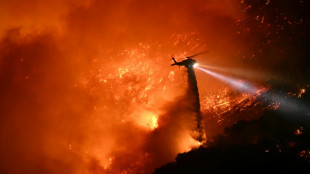 January sets 'surprising' heat record: EU monitor
January sets 'surprising' heat record: EU monitor
-
Chagos islanders' dream of return now waiting on Trump

-
 South Korea ministries, police block DeepSeek access
South Korea ministries, police block DeepSeek access
-
US government vessels to sail free through Panama Canal: State Dept

-
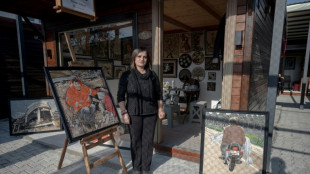 For quake survivors, art brings healing in Turkey's Antioch
For quake survivors, art brings healing in Turkey's Antioch
-
Turkey marks second anniversary of quake disaster

-
 India's sacred boat service for giant Hindu festival
India's sacred boat service for giant Hindu festival
-
Pioneering Pakistan woman MMA fighter breaks barriers... and arms

-
 Heat send disgruntled star Butler to Warriors: reports
Heat send disgruntled star Butler to Warriors: reports
-
Asian markets advance after Wall St gains, US Postal Service U-turn

-
 US aid cuts come at deadly moment for malaria control
US aid cuts come at deadly moment for malaria control
-
Art fair in Marrakesh brings African art to global stage
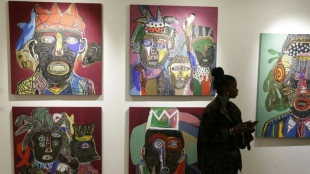
-
 US waives aid ban to boost Haiti mission
US waives aid ban to boost Haiti mission
-
Mailata urges Rees-Zammit not to give up NFL dream

-
 Google halts workplace diversity push
Google halts workplace diversity push
-
Five ways in which Argentina's Milei has mirrored Trump
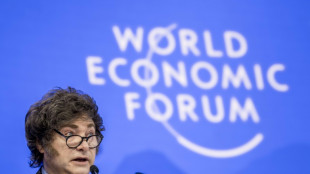
-
 Howe vows Newcastle will learn from Wembley pain in League Cup final
Howe vows Newcastle will learn from Wembley pain in League Cup final
-
Leverkusen back from brink to reach German Cup semi-finals

-
 Google shares slump but other AI gains lift US stocks
Google shares slump but other AI gains lift US stocks
-
Italian qualifier Bellucci stuns Medvedev in Rotterdam

-
 Trump signs order barring trans athletes from women's sports
Trump signs order barring trans athletes from women's sports
-
Real Madrid snatch late Leganes win to reach Copa del Rey semis

-
 Newcastle sweep aside Arsenal to reach League Cup final
Newcastle sweep aside Arsenal to reach League Cup final
-
UN chief warns against Gaza 'ethnic cleansing' after Trump comments

-
 NFL to play 2026 regular-season game in Melbourne, Australia
NFL to play 2026 regular-season game in Melbourne, Australia
-
Top yet contested climate scientist declares 2C climate goal 'dead'
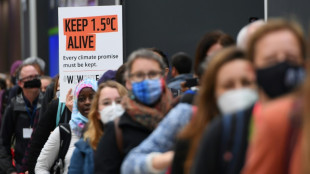
-
 Bucks get Kuzma from Wizards as NBA trade deadline nears: reports
Bucks get Kuzma from Wizards as NBA trade deadline nears: reports
-
US appears to backtrack as Trump Gaza plan sparks global outcry

-
 French PM survives no-confidence votes
French PM survives no-confidence votes
-
Chiefs' Araiza reflects on road from outcast to the Super Bowl

-
 Merkel urges parties to calm pre-election 'turmoil'
Merkel urges parties to calm pre-election 'turmoil'
-
Guatemala promises surge in deportation flights, courting Rubio

-
 US Marine vet acquitted in NY subway death joins tech firm
US Marine vet acquitted in NY subway death joins tech firm
-
England boss Borthwick needs time just like Amorim at Man Utd, says right-hand man

-
 LIV Golf players given direct path into US Open
LIV Golf players given direct path into US Open
-
French star Ntamack suspended, misses England Six Nations clash

-
 NWSL agrees to $5 mln player mistreatment settlement
NWSL agrees to $5 mln player mistreatment settlement
-
Disney profits rise on strong 'Moana 2' sales

-
 Pentagon says 10 'high-threat' migrants being held at Guantanamo
Pentagon says 10 'high-threat' migrants being held at Guantanamo
-
In and out as South Africa lose fast bowler Coetzee for Champions Trophy

-
 French PM survives no-confidence vote
French PM survives no-confidence vote
-
M23, Rwandan troops launch fresh DR Congo offensive

-
 Trump to sign order barring trans athletes from women's sports
Trump to sign order barring trans athletes from women's sports
-
Sweden mourns after school massacre

-
 Following Trump, Argentina quits World Health Organization
Following Trump, Argentina quits World Health Organization
-
Google shares slump as trade tensions rattle markets

-
 Mathys Tel '100 percent' committed to Spurs, says Postecoglou
Mathys Tel '100 percent' committed to Spurs, says Postecoglou
-
Chelsea star Kerr says treated differently because of 'skin colour'

-
 WHO worker aims to raise $1 bn to cover US pullout
WHO worker aims to raise $1 bn to cover US pullout
-
Tesla sales fall in Germany as Musk backs far right


US aid cuts come at deadly moment for malaria control
The sudden freezing of US aid to malaria projects comes as deadly new variants are spreading in Africa and could have a devastating impact, the head of a major NGO told AFP.
The US government has provided some 40 percent of the annual funding globally for control and research into a disease that causes more than 600,000 deaths from 250 million cases each year -- mostly in Africa.
That funding, of up to $1 billion a year, is now frozen as part of President Donald Trump's plan to axe foreign aid.
"We did try to anticipate in advance of this, but I think even our worst case scenarios have been surpassed," said James Tibenderana, chief executive of the London-based Malaria Consortium that runs projects around the world.
The Malaria Consortium has already been forced to fire staff working on a programme in Mozambique and halt a programme in Asia training people to monitor and control mosquitoes.
Only five percent of its funding comes from the US government, but Tibenderana said US cuts would hit the entire sector.
"It's just so disruptive, so sudden," he said.
He highlighted that it came at a moment when the first signs of drug- and insecticide-resistance had started to emerge.
"The clock is ticking for drug resistance in Africa," he said.
"The early signs of resistance to the artemisinin-based combination therapy medicine, which is the mainstay of treatment for malaria, are emerging."
He pointed to reports from Eritrea, Ethiopia, South Sudan, Sudan and Uganda.
US-funded organisations have been the major player in monitoring this emergence through genome-mapping and drug-effectiveness studies.
Without them, it will be "hard to detect at the scale that was possible with US government funding", said Tibenderana.
- 'Through the woodchipper' -
It also comes as an invasive mosquito species from Asia -- Anopheles stephensi -- has started spreading in East Africa.
It thrives in urban areas and is immune to insecticide, potentially putting an additional 126 million people in Africa's cities at risk of malaria, according to one 2020 study.
"The invasion and spread of Anopheles stephensi has the potential to change the malaria landscape in Africa and reverse decades of progress we've made towards malaria control," Meera Venkatesan, who was then malaria division chief for USAID, told AFP in November.
Her division has now been shuttered along with the rest of USAID by Trump, with his billionaire ally Elon Musk boasting this week that he had put the vast humanitarian agency "through the woodchipper".
Funding cuts will hit supply chains, rural hospitals and programmes to buy the latest mosquito nets.
They will force poor families into debt when they need to send their children to hospital, said Tibenderana.
Children under five account for around 80 percent of malaria deaths in Africa, according to the World Health Organization.
Tibenderana hoped other governments and institutions such as the World Bank will step in, though he knows resources are scarce.
He compared the US funding freezing to the recent pandemic.
"We have to respond as we did with the Covid-19 pandemic, where there was a threat and people stepped up," he said.
"But the suddenness of this is huge."
Ch.Campbell--AT
